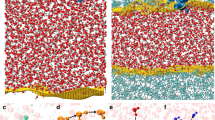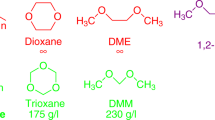Abstract
PREVIOUS work1 has indicated that a larger number of gaseous hydrocarbons should be studied before a comprehensive theory of the influence of molecular structure on electric breakdown can be advanced.
This is a preview of subscription content, access via your institution
Access options
Subscribe to this journal
Receive 51 print issues and online access
$199.00 per year
only $3.90 per issue
Buy this article
- Purchase on Springer Link
- Instant access to full article PDF
Prices may be subject to local taxes which are calculated during checkout
Similar content being viewed by others
References
Heylen, A. E. D., and Lewis, T. J., Brit. J. App. Phys., 7, 411 (1956).
Haylen, A. E. D., Ph.D. thesis, University of London (January 1957).
Crowe, R. W., and Devins, J. C., Annual Report, Conference on Eletrical Insulation, p. 4 (Washington: National Academy of Sciences, National Research Council, 1953).
Devins, J. C., and Crowe, R. W., J. Chem. Phys., 25, 1053 (1956). Crowe, R. W., and Devins, J. C., Nature, 179, 976 (1957).
Wagner and Duncan, J. Chem. Phys., 21, 516 (1953).
Author information
Authors and Affiliations
Rights and permissions
About this article
Cite this article
HEYLEN, A. Electric Strength of Unsaturated Hydrocarbon Gases. Nature 180, 703–704 (1957). https://doi.org/10.1038/180703a0
Issue Date:
DOI: https://doi.org/10.1038/180703a0
Comments
By submitting a comment you agree to abide by our Terms and Community Guidelines. If you find something abusive or that does not comply with our terms or guidelines please flag it as inappropriate.



